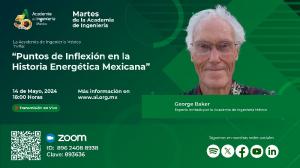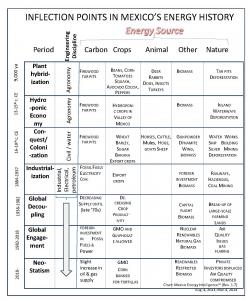Houston Energy Consultant George Baker to Address Mexican Academy of Engineering
As the presidency of Andrés Manuel López Obrador comes to a close, it is an opportune moment to review the long arc of the history of energy in Mexico
Talos Energy (NYSE:Talos Energy, Inc.)
The public's understanding of Mexico’s energy history and outlook is in need of a reset”
HOUSTON, TX, UNITED STATES, May 14, 2024 /EINPresswire.com/ -- George Baker, the long-time publisher of Mexico Energy Intelligence, an industry newsletter, will address the Mexican Academy of Engineering on the inflection points in Mexico’s energy history. The Academy was created in 2002 with the fusion of two professional associations. Its offices are in the storied Palace of Mining, which was constructed at the end of the Colonial Period in the neoclassical style of architecture. — George Baker
In his presentation, the Duke Ph.D. in history will emphasize the outsize role of engineers in energy production and infrastructure.
“The greatest engineers in Mexican history were agronomists,” he insists. He observes that it was the energy made possible by the genetic modification of ancient grasses that allowed for the flourishing of the civilizations of the Classic Period. “The majestic pyramids and temples of the Mayan, Zapotec, Olmec, and Teotihuacan civilizations were made possible by the energy of the hybridized corn, beans and other crops,” he observes. In place of “Pre-Hispanic” as the name of the period, he proposes “Maize America.”
The arrival of the Europeans in the 16th century dynamized the energy landscape. Spaniards brought not only new crops but, as important, technologies, tools, and domesticated animals. The wheel revolutionized transportation as did the arch for the construction of aqueducts and churches. The energy of horses and mules did work previously carried out by humans. Goats, sheep, and pigs were new sources of protein.
The 40-year period of industrialization that began around 1880 introduced energy from petroleum and thermo- and hydroelectricity. By 1920, Mexico was the largest exporter of crude oil after the United States.
A prolonged period of declining expectations in energy supply began in 1917 as successive administrations moved away from market solutions. Constitutional article 27, which was promulgated in that year, disrupted the business model of British and American oilmen. The oil expropriation of 1938 was an act of decoupling Mexico from global hiring and managerial and technological innovation.
Regarding the current period, Dr. Baker offers the label “Energy Irredentism.”
The label alludes to the depiction by Mexico’s President Andrés Manuel López Obrador of the oil leases, contracts and asset sales that had been carried out by his predecessors as tantamount to the alienation of Mexico’s patrimony. “In seeking the recovery of some of that patrimony, in 2022 the president "appropriated the operatorship and half of the commercial rights to a near-giant oil reservoir, named Zama, which had been discovered in 2017 by a consortium led by Houston’s Talos Energy. On April 18th of this year, he expropriated the hydrogen plant that had been sold in 2017 to Air Liquide, the global French industrial gas company.”
“The public's understanding of Mexico’s energy history and outlook is in need of a reset,” the consultant insists. “The increased availability of energy in the forms of animal and plant protein, British Thermal Units (BTUs), and kilowatt-hours will improve social welfare with outcomes measurable in productivity, education, and public health. What is called ‘energy policy’ attends to only a fraction of society’s needs for energy.” Public policies in the past and future are about the intertwined relationship among these sources of energy.
He concludes that engineers, supported by economists, political scientists, and historians, will need to step forward to advise the next government about how to reset the national energy narrative in ways that allow for a sustainable re-engagement with global markets and the rebuilding of trust with investors.
His presentation is based on a 2023 study (MEI Report 967) entitled "Due Diligence Re Mexico's Energy Record."
ZOOM ID: 896 2408 8938 Pass code: 893636
George Baker
Baker & Associates, Energy Consultants
+1 832-434-3928
email us here
Visit us on social media:
Facebook
Twitter
LinkedIn
Other
Legal Disclaimer:
EIN Presswire provides this news content "as is" without warranty of any kind. We do not accept any responsibility or liability for the accuracy, content, images, videos, licenses, completeness, legality, or reliability of the information contained in this article. If you have any complaints or copyright issues related to this article, kindly contact the author above.



